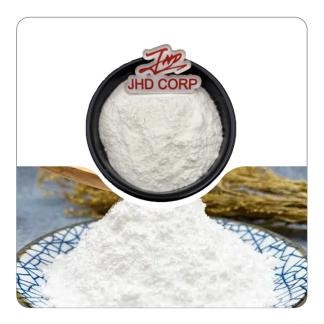Welcome to JHD Nutrasource!
Shop
L-Aspartate Powder
L – Aspartate powder is a white crystalline or crystalline powder. It is a non – essential amino acid, which means the human body can synthesize it on its own to some extent. It has a molecular formula of C₄H₇NO₄.
Description
| Product Name | L – Aspartate powder |
| Appearance | white to off-white crystalline powder |
| Specification | ≥98% |
| Test Method | HPLC |
| Source | through a chemical process |
| Certificate | USP/EP/JP/Kosher/Halal/GMP |
| CAS No | 56-84-8 |
| MF No | C₄H₇NO₄ |
Functions
- Energy Production: It participates in the tricarboxylic acid cycle, an important metabolic pathway in the body, helping to convert nutrients into adenosine triphosphate (ATP), which is the energy currency of cells. This process is crucial for providing energy to support various physiological activities.
- Neurotransmission: L – Aspartate acts as a neurotransmitter in the central nervous system. It is involved in signal transmission between nerve cells, playing a role in cognitive function, memory, and learning.
- Ammonia Detoxification: It can combine with ammonia in the body to form urea through a series of enzymatic reactions, thereby helping to remove excess ammonia, a toxic by – product of protein metabolism. This is particularly important for maintaining normal liver and kidney functions.
- Metabolic Regulation: It is involved in the metabolism of other amino acids and biomolecules. For example, it can be converted into other amino acids such as L – asparagine, which is used in protein synthesis and other biological processes.
Applications
- Medical Field: It is used in the treatment of heart disease, as a liver function promoter, an ammonia antidote, and a fatigue – relieving agent. It is also an ingredient in amino acid infusions and can be used to synthesize various drugs, such as L – aspartate potassium, magnesium, and calcium3. In addition, it shows potential as an intermediate in the manufacturing of tumor suppressors.
- Food Industry: It is a good nutritional supplement and can be added to various soft drinks, bread, biscuits, and other foods to provide essential amino acids. It also serves as a flavor enhancer, helping to regulate the acidity and sweetness of foods. In the production of the artificial sweetener aspartame, L – aspartate is a key raw material.
- Cosmetics Industry: It can be used as a nutritional additive in cosmetics. Its biodegradable property makes it suitable for use in personal care products, as it can be completely broken down in the environment.
- Agriculture and Animal Feed: As a nutritional supplement in fertilizers, it can improve the efficiency of nutrient uptake by plants. In animal feed, it helps meet the amino acid requirements of livestock and poultry, promoting their growth and development.

